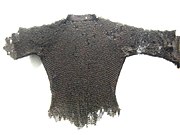Hauberk
Hauberk
From Wikipedia, the free encyclopedia
A hauberk is a shirt of mail armour. The term is usually used to describe a shirt reaching at least to mid-thigh and including sleeves. Haubergeon ("little hauberk") generally refers to a shorter variant with partial sleeves, but the terms are often used interchangeably.[1] Slits to accommodate horseback-riding are often incorporated below the waist. Most are put on over the head. Hauberk can also refer to a similar garment of scale armour.
[edit] History
The word hauberk is derived from an old German word Halsberge, which originally described a small piece of mail that protects the throat and the neck (the 'Hals'). The Roman author Varro attributes the invention of mail to the Celts. The earliest extant example was found in Ciumeşti in modern Romania and is dated to the 4th-5th centuries BC. Roman armies adopted similar technology after encountering it. Mail armour spread throughout the Mediterranean Basin with the expansion of the Romans and was quickly adopted by virtually every iron-using culture in the world, with the exception of the Chinese, who used it rarely despite being heavily exposed to it from other cultures.
The short-hemmed, short-sleeved hauberk may have originated from the medieval Islamic world.[1] The Bayeux Tapestry illustrates Norman soldiers wearing a knee-length version of the hauberk, with three-quarter length sleeves and a split from hem to crotch. Such armor was quite expensive — both in materials (iron wire) and time/skill required to manufacture it — so common foot soldiers rarely were so equipped.
The hauberk stored in the Prague Cathedral, dating from the 12th century, is one of the earliest surviving examples from Central Europe and was supposedly owned by Saint Wenceslaus. In Europe, use of mail hauberks continued up through the 14th century, when plate armor began to supplant it. In parts of Central Asia, it continued to be used longer.
[edit] Construction
The hauberk is typically a type of mail armour which is constructed of loops of metal woven into a tunic or shirt. The sleeves sometimes only went to the elbow, but often were full arm length, with some covering the hands with a supple glove leather face on the palm of the hand, or even full mail gloves. It was usually thigh or knee length, with a split in the front and back to the crotch so the wearer could ride a horse. It sometimes incorporated a hood, or coif.
[edit] References
^ David Nicolle (1994), Saracen faris 1050-1250 A.D., Osprey Publishing, p. 58, ISBN 1855324539Source:
http://en.wikipedia.org/wiki/Hauberk





Comments